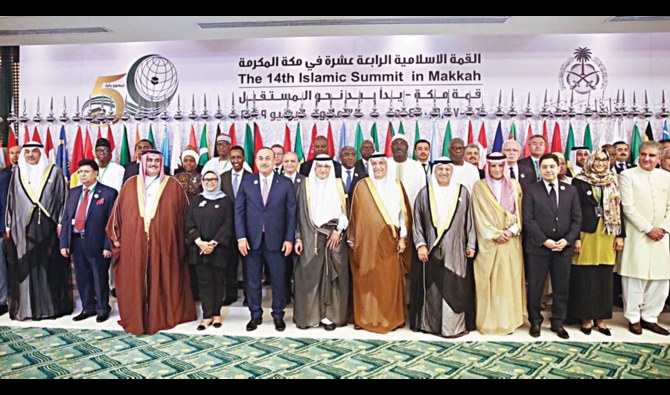JEDDAH: The preparatory meeting of foreign ministers of member states of the Organization of Islamic Cooperation (OIC) kicked off in Jeddah on Wednesday under the chairmanship of Foreign Minister Ibrahim Al-Assaf.
The meeting, which coincides with the OIC’s 50th anniversary, is in preparation for the 14th ordinary session of the Islamic Summit Conference, which will begin in Makkah on Friday under the banner “Makkah Summit: Hand in Hand Toward the Future.”
In his opening address, Al-Assaf said the Islamic world faces extremely dangerous challenges and changes, including interference in the internal affairs of countries, rising numbers of refugees and displaced people, and the spread of terrorism, extremism and sectarianism.
Countries need to take a serious stand and study the issues from all sides, adopting the best possible approach to dealing with them through a unified position and efforts, he said.
Al-Assaf said that the conflict with Israel remains the most important challenge facing the Islamic world.
The Palestinian cause is the “first issue” of Saudi Arabia, he said, in particular the regaining of Palestinian people’s full legitimate rights and the establishment of an independent state with East Jerusalem (Al-Quds) as its capital in accordance with international resolutions and the Arab peace initiative backed by the decisions of consecutive Arab and Islamic summits.
“The international community must shoulder its political and moral responsibility to achieve this,” he said.
Al-Assaf said that the Kingdom attaches great importance to stability in Yemen and condemns a continuing coup by Iranian-backed Houthi militias against the legitimate authority, which is “a clear example of Iran’s continued interference in the internal affairs of countries, which must be rejected by OIC, as it is contrary to its charter and international charters.”
He also affirmed the Kingdom’s stand with Sudan and support for the transitional military leadership, along with measures taken in the interest of the Sudanese people.
The Kingdom backs sincere efforts to find a political solution that will preserve the unity and institutions of Syria and end the presence of sectarian terrorist groups, based on the Geneva outcomes, statements of the International Syria Support Group and relevant Security Council resolutions, Al-Assaf said.
He also affirmed the Kingdom’s firm support for the sovereignty and unity of Libya, its territorial integrity and the rejection of foreign interference, calling on all parties in the country to unite, block and fight terrorist groups.
In his speech, Yousef Al-Othaimeen, secretary-general of the OIC, expressed his gratitude to King Salman and Crown Prince Mohammed bin Salman for Saudi Arabia hosting the summit and its preparatory meetings.
Al-Othaimeen also praised Saudi Arabia’s support for the OIC and its generous contributions in serving Islamic causes.
He extended his thanks to Turkey for its hosting of the 13th summit and the outcome of the forum.
“There is no doubt that the unfortunate developments witnessed by some member states, and the deterioration of the security and humanitarian situation in some member states where there are conflicts urge us to intensify our discussions, and increase our efforts to establish security and peace in our region so as to ensure justice, decent life, development for present and future generations,” he said
“These unprecedented current developments in our modern history should in no way distract our attention from our central cause, the Palestinian issue,” he said.
Israeli policies and disregard for international legitimacy resolutions call for the OIC to further coordinate efforts to press for a global position toward consolidating peace, and put an end to the Israeli occupation and the suffering of the Palestinian people.
The OIC is closely following the situations in Yemen, Somalia, Libya, Syria, Afghanistan, Iraq, Mali, Sudan, Algeria, Guinea, Nigeria, Niger, Sierra Leone, Cote d’Ivoire, Djibouti, the Comoros and Central Africa along with others, he said.
“We are following with deep concern the bloody events against the security of the people of Jammu and Kashmir, the developments in the Nagorno-Karabakh region, the conditions of the Rohingya, the Muslim peoples of Turkish Cyprus, Bosnia and Kosovo and the situation of Muslim societies in the rest of the world,” he said.
Al-Othaimeen said that extremism and terrorism remain one of the greatest threats to the region’s security and stability, and to the whole world.
“Extremism and terrorism are aimed at undermining the cohesion of our societies, disrupting our member states’ growth, and depleting their energies and capabilities,” he said.
“Considering the dangers of these evil factors, we reaffirm the importance of coordinating our efforts in combating all forms of terrorism, in accordance with a comprehensive strategy that takes into account all the security, economic, cultural, social and intellectual dimensions associated with terrorism and extremism and the ways promoting for them or even leading to them.
“All in all, for our countries to avoid the risks of extremism and terrorism, we have to earnestly join hands to confront these evil acts.
“This can be achieved only in a framework of effective cooperation and solidarity among all Muslim countries, drawing on their noble values, strong civilizational ties and common interests,” he said.
He added that the convening of the Islamic summit during the holy month of Ramadan and on this holy land reflect Saudi Arabia’s concern for cooperation and coordination with the rest of the Islamic states to achieve these goals and to advance the reality of our Islamic world and put it in a place it deserves.
Pakistan’s Foreign Minister, Shah Mehmood Qureshi, told Arab News that his country’s message to the summit is that Muslims “should join hands, understand their individual concerns, and have a collective objective of peace and stability so that our region can develop like other developed part of the world.
“By not joining hands, how are we going to achieve what we want to achieve, if we do not sit and resolve our issues through diplomatic means? We should keep on joining hands as that is the only way forward,” he said.


































